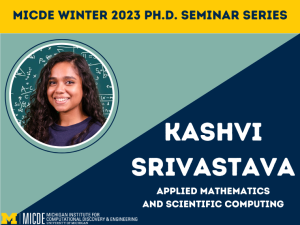Presented By: Michigan Institute for Computational Discovery and Engineering
MICDE Ph.D. Student Seminar: Kashvi Srivastava
Kashvi Srivastava, PhD candidate in Applied & Interdisciplinary Mathematics and Scientific Computing

Topic: Deterministic and Stochastic Modeling of Dynamical Systems in Chemical Kinetics
Chemical reactions are ubiquitous in nature in the form of biological and physical processes. We use nonlinear ordinary differential equations to mathematically model these processes in the deterministic regime. If a given process occurs at disparate time-scales, we can further reduce the number of equations to obtain a quasi-steady-state approximation of the system. In this talk, we consider a significant mechanism in chemical kinetics called the Michaelis–Menten reaction and its different quasi-steady-state reductions. We focus on the challenges faced in applying classical reduction theory on the system and the conditions under which its reductions are valid in the stochastic regime. We make use of a stochastic simulation algorithm called the Gillespie algorithm to demonstrate the accuracy of the reduced systems and to disprove a commonly-accepted qualifier for the validity of the stochastic approximation.
Chemical reactions are ubiquitous in nature in the form of biological and physical processes. We use nonlinear ordinary differential equations to mathematically model these processes in the deterministic regime. If a given process occurs at disparate time-scales, we can further reduce the number of equations to obtain a quasi-steady-state approximation of the system. In this talk, we consider a significant mechanism in chemical kinetics called the Michaelis–Menten reaction and its different quasi-steady-state reductions. We focus on the challenges faced in applying classical reduction theory on the system and the conditions under which its reductions are valid in the stochastic regime. We make use of a stochastic simulation algorithm called the Gillespie algorithm to demonstrate the accuracy of the reduced systems and to disprove a commonly-accepted qualifier for the validity of the stochastic approximation.